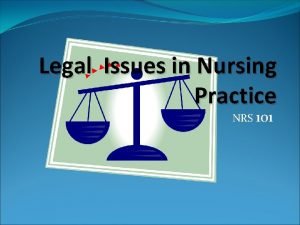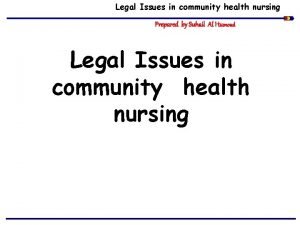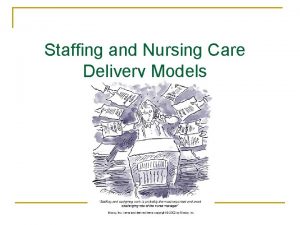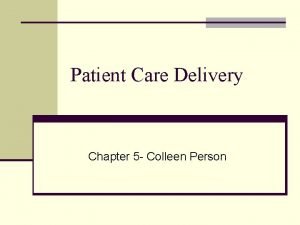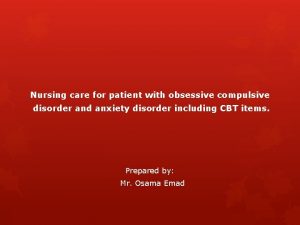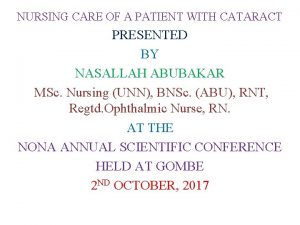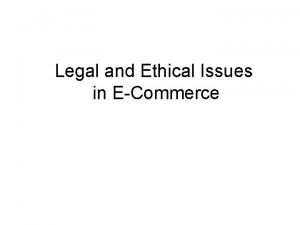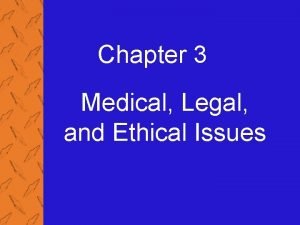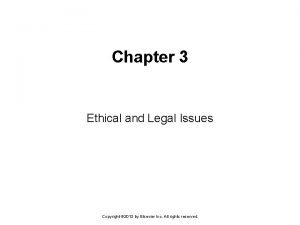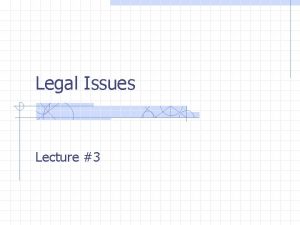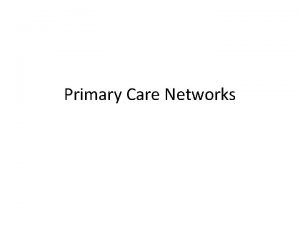Legal Issues In Primary Care Nursing Gaynor Kynaston



























- Slides: 27

Legal Issues In Primary Care Nursing Gaynor Kynaston Solicitor Legal and Risk Services

Legal and Risk Services 2134 Clinical Negligence Claims for NHS in Wales 190 ‘Putting things right’ 27 solicitors, 4 trainees, 3 clin neg paralegals Claims involve a variety of healthcare professionals

Aims and objectives Potential legal issues arising from nursing practice in particular titration Standards of medicine management Consent/Capacity Record Keeping

Potential legal problems Civil claim Criminal action – assault, witness Inquest Complaint to professional regulatory body, NMC

Professional Accountability Statutory Duty Meet standards laid down by Professional Body Act within professional competence Act within the law Responsible for own actions and actions of others

Work within the law Consent of employer Vicariously liable Appropriate qualifications Appropriate training Work according to policy and protocol

Civil Claim Pre-requisites to a successful civil claim Owe patient a Duty of Care Breach of Duty of care occurs The breach Causes harm to the patient Material Contribution – Bailey v MOD & Another [2008] EWCA

Duty of Care All healthcare professionals treating a patient owe a duty of care to them The test of when that duty is breached is a peer test. The law will judge your practice against that of a responsible body of practitioners with your qualification – Bolam v Friern Hospital Management Committee [1957]

Sources of breach of duty Incorrect act An omission Delay Invalid consent Record-keeping

Examples of breach of duty MMR given instead of Hib Neuropathy following venepuncture Pt given follow up treatment for only 1 month rather than a year (breach of duty - record keeping) Iatrogenic injury Delay in referral to hospital led to cauda equina symdrome Script for atropine given to wrong patient-glaucoma

Material Contribution - Bailey Exploration of common bile duct. Post –op: no recovery chart, no records following transfer to ward, no records of review until 8 am next morning. Deteriorated ? Post op pancreatitis. Acute renal failure, respiratory failure, acute pancreatitis Trans Portsmouth – Gastroscopy – further surgery due to bleed – now septic Made steady progress initially – PEG and oral fluids

Bailey cont’d Vomited – aspirated – arrested – permanent brain damage Held: Aspirated due to weakness – weakness due to a combination of lack of rescusitation following first procedure and pancreatitis. Had she been adequately resuscitated she would have been stronger and not lost gag reflex. If negligence more than negligible then material contribution established Claimant can recover in full

NMC Code of Conduct Provide high standard of care at all times Personally accountable for your own actions Always act lawfully Ensure you obtain consent before you begin any treatment or care Be aware of the legislation surrounding mental capacity Delegate effectively – competence, standards, supervision and support

When is consent necessary For every examination, investigation and treatment Written - Verbal – Implied You will need to explain the method of titration to the patient to give them an opportunity to raise any concern, could be by way of leaflet that you go through with them

Who should obtain Consent Usually the individual performing a procedure should be the person to obtain consent. In certain circumstances, you may seek consent on behalf of colleagues if you have been specially trained for that specific area of practice. Obtaining consent can be delegated providing Anyone you delegate to can carry out your instructions; and The outcome of any delegated task must meet the required standard. (NMC: Guidance on consent)

Valid Consent Capacity Informed Voluntary Continuing

Capacity to consent Mental Capacity Act 2005 Over 16 Presumption of capacity s 1(2) If pt has capacity – bound by decision however irrational Record advice given Get pt to sign – record any refusal to do so Countersignatory

Medicines Management NMC Standards for Medicine Management (2012) – Document governing the supply and administration of medicines Covers Titration: standard 13 Delegation: standard 17 Students and unregistered staff: standards 18 and 19 respectively

Titration Where medication has been prescribed within a range of doses, it is acceptable for Registrants to titrate doses according to patient response and symptom control, and to administer within the prescribed range. Registrant must be competent to interpret test results and assess patient Record Keeping

Delegation to other members of the team Registrant is “responsible for the delegation of any aspect of the administration of medicinal products and they are accountable to ensure that the patient, carer or care assistant is competent to carry out the task” This will require education, training and assessment of the patient, carer or assistant. Competence should be assessed and reviewed periodically. Records of training received and outcome of assessments should be made and be available.

Unregistered practitioners are those providing care who are neither registered or licensed by a regulatory body and have no legally defined scope of practice In delegating the administration of medicinal products to unregistered practitioners, it is the registrant who must apply the principles of administration of medicinal products. They may then delegate an unregistered practitioner to assist in ingestion or application

Assessment: standard 9 As a registrant, you are responsible for the initial assessment and continued assessment of patients who are self administering and you have continuing responsibility for recognising and acting upon changes in a patient’s condition with regards to the safety of the patient and others.

Confidentiality Duty Maintain it unless -Consent -Best interests -Statute/regulations DPA 1998 -Court Order -Public interest

Record keeping Part of your duty of care to your patient and as important as administering treatment Poor record keeping leads to unnecessary claims against NHS bodies Poor record keeping makes claims difficult to defend Judged by standard of records

Summary Checklist Can I demonstrate my competence to my patients, my manager, my professional body or a lawyer? Work within your competence; record your learning in a portfolio; review your recording keeping

Relevant documents/legislation Documents The Code: Standards of Conduct, Performance and Ethics for Nurses and Midwives (2008) Standards for Medicine (2010) Legislation Medicines Act 1968 Misuse of Drugs Act 1971 Misuse of Drugs Regulations 2001

Legal and Risk Services
 Primary secondary tertiary care
Primary secondary tertiary care Gaynor watson-creed
Gaynor watson-creed Legal issues in nursing practice
Legal issues in nursing practice Ethical and legal issues affecting the nursing assistant
Ethical and legal issues affecting the nursing assistant Legal issues in community health nursing
Legal issues in community health nursing Legal issues in psychiatric nursing
Legal issues in psychiatric nursing Nursing legal terms
Nursing legal terms Modular nursing model
Modular nursing model Modular nursing
Modular nursing Primary nursing vs total patient care
Primary nursing vs total patient care Steriotaxis
Steriotaxis Nursing diagnosis for obsessive compulsive disorder
Nursing diagnosis for obsessive compulsive disorder Preoperative nursing care of cataract patient
Preoperative nursing care of cataract patient Legal issues of ict in education
Legal issues of ict in education Legal ethical and societal issues
Legal ethical and societal issues Legal and ethical issues in computer security
Legal and ethical issues in computer security Ethical issues of e commerce
Ethical issues of e commerce Legal and ethical issues in computer security
Legal and ethical issues in computer security Ethical and legal issues involved in practicum
Ethical and legal issues involved in practicum Chapter 2 ethical and legal issues
Chapter 2 ethical and legal issues Medical legal and ethical issues chapter 3
Medical legal and ethical issues chapter 3 Chapter 3 legal and ethical issues
Chapter 3 legal and ethical issues Legal issues in performance appraisal
Legal issues in performance appraisal Legal issues in hrm
Legal issues in hrm Attack sophistication vs intruder technical knowledge
Attack sophistication vs intruder technical knowledge Legal and ethical issues chapter 5
Legal and ethical issues chapter 5 Legal issues in sport/event marketing match-up
Legal issues in sport/event marketing match-up Legal and ethical issues chapter 3
Legal and ethical issues chapter 3


